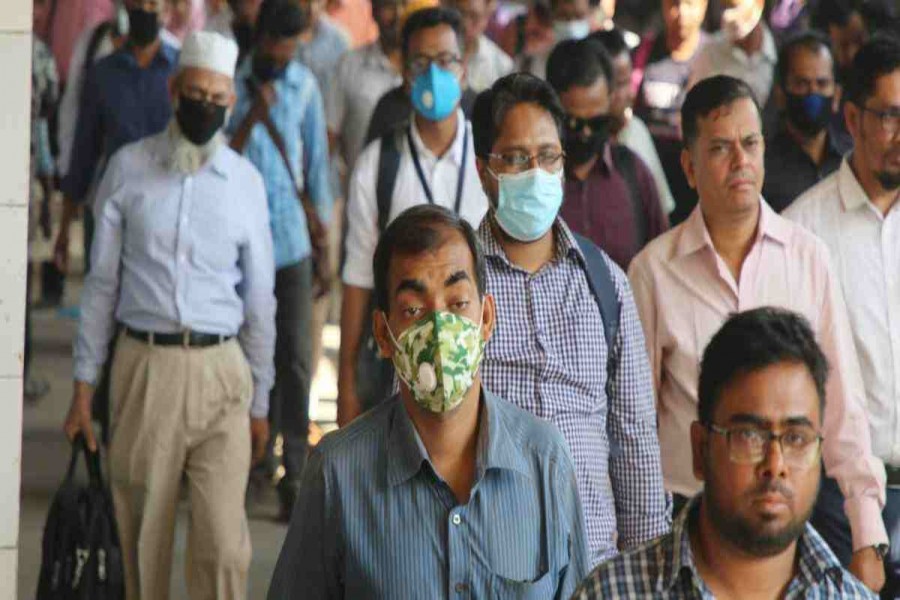
Published :
Updated :

The pandemic is not yet over. From the early part of December last, the intensity of Covid-19 was on the decline. But from the first day of the current month, the rate of infection took a reverse turn and the curve has been moving upward since then.
The decline in both infection and death and the start of the vaccination from February 07 last, lifted an otherwise sour mood of the people. The resurgence of infection lately, however, has whipped up some concern among the people, but not as intense as it was earlier.
People from all walks of life have started their life anew, trying to piece together what they had been left in the wake of the pandemic. They are unlikely to be deterred even by a moderate level of the resurgence of the disease.
What now remains important for the poor and low-income people is ensuring an uninterrupted income, even less than what they used to earn during the pre-Covid days. For, they know that the time is altogether different now.
The South Asian Network on Economic Modelling (SANEM) through a recent survey has tried to find out the income situation of the working population.
It is needless to mention here that a large number of people had either lost their jobs or gotten their wages reduced between March and May. Many of the unemployed people went back to their villages. As soon as the government relaxed most of the restrictions at the end of May last year, those people started coming back to cities and towns in search of work. Some of them have got their jobs back and some have not. Around 62 per cent of the respondents of the SANEM survey, reportedly, have said they are now getting lower wages than that of the pre-Covid time.
The survey found that nearly 8.0 per cent of people had lost their jobs during the March-December period and about the same percentage of people are yet to find work.
The findings of the survey relating to joblessness during the peak time of the pandemic might appear a bit conservative to many people. The micro, small and medium scale industrial and service sector enterprises being hit hard by the pandemic had shed thousands of jobs between March and May last year. When businesses reopened gradually, these enterprises started reemploying workers but at a very slow pace since their daily turnover had been far less than before. They also offered wages lower than the previous ones to their reemployed individuals. The latter, in most cases, accepted the offer since they had no alternatives. Then again, many displaced workers/ employees are yet to find new jobs.
The situation with the day labourers, who generally work in the construction sector, is a case in point. Most day labourers had returned to their villages following the outbreak of the pandemic and led a miserable life there. Now they are back on the city streets. There are also new entrants. As the demand for day labourers has not yet reached the pre-Covid level, a good number of them do not find work daily. Some even go without work for days together.
From the outside, it may seem that the economy is back to full gear. But the reality is different, particularly in the construction, transport, hotel and restaurant sectors. These sectors employ millions of workers across the country.
Similarly, thousands of retail shops, small automobile workshops, laundries etc, do provide jobs to a huge number of workers. The wages they offer may be small, but that is considered a genuine help for the economically hard-pressed families.
Thus, it is very important to help all the small-scale businesses and retail shops make a turnaround. The government had announced a stimulus package for the MSMEs. But the disbursement of the fund has not been up to the desired level. The government has tried to speed up the disbursement and the central bank instructed the banks on several occasions in this respect.
It is suspected that a large number of MSMEs are yet to receive any support from the stimulus package. It could be that most of them have not approached the banks seeking the same. Traditionally, the MSMEs are shy of formal financial institutions for a variety of reasons. They, usually, do not feel comfortable with the banks. The attitude of the banks to micro and small-scale borrowers could also be one of the reasons. Indifference towards them discourages the MSMEs from going to formal financial institutions.
But gearing up the MSMEs to the fullest extent is very important, not just to help the economy accrue higher benefits but also to enable these enterprises to pay better wages and employ more and more people.
The plight of the poor and low-income people is not visible. But they are suffering. The soaring prices of essentials have only heightened that.
So, the government should devise ways and means to reach the MSMEs that need funds. It should also focus its attention on areas that have the potential to generate a greater number of jobs.


 For all latest news, follow The Financial Express Google News channel.
For all latest news, follow The Financial Express Google News channel.